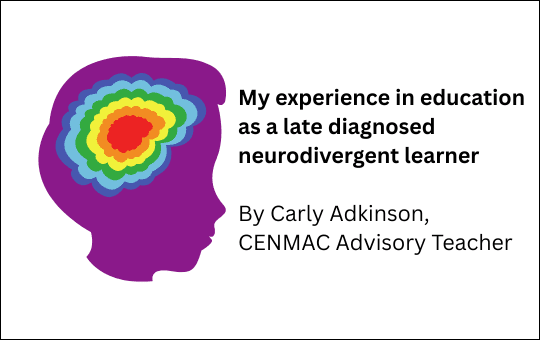My Experience in Education as a Late Diagnosed Neurodivergent Learner
At 40 years old, I was diagnosed with ADHD, and it was like everything in my life finally started making sense. The decision to seek a diagnosis came after watching my son struggle in ways that felt painfully familiar. His challenges with focus, organisation, and executive functions mirrored my own experiences growing up, and it made me reflect on my childhood, education, and career. Finally, I had an explanation for the struggles I had faced for so long.
My Early Struggles
Growing up, school was a constant uphill battle. I was often told at school and at home that I just needed to “apply myself” or “try harder,” which left me feeling as though my struggles stemmed from a lack of effort. While I loved learning, I struggled to keep up with the demands of school—forgetting homework, missing deadlines, and losing focus. These difficulties weren’t understood, and I was labeled as lazy or careless.
This deeply affected my confidence and self-esteem. Each forgotten assignment or missed deadline felt like another failure, leaving me feeling inadequate and as though I could never measure up to expectations. These experiences had a lasting impact, making me doubt my own potential, even when I later achieved significant milestones.
I initially struggled with my GCSEs and didn’t pass them the first time. When I went on to university, I faced ongoing challenges and ended up switching degrees before finding the right fit. Despite these difficulties, I became the first in my family to earn a degree, achieving a 2:2—a grade I take great pride in. However, the process was incredibly draining, impacting both my confidence and energy. Still, I refused to let these setbacks hold me back and remained determined to move forward.
These struggles followed me into my professional life. Managing deadlines, organising tasks, and juggling responsibilities felt overwhelming, and I often felt misunderstood. While I excelled in creativity and problem-solving, I found myself constantly fighting to keep up with the organisational aspects of work, which led to frequent job changes.
Discovering My Passion for Teaching
Despite these challenges, I discovered that teaching was my true calling. The demands of the profession—managing lesson plans, paperwork, and the constant need to multitask—were often overwhelming, but the role itself felt like a perfect fit. I developed a profound passion for supporting young people, particularly neurodivergent learners who faced the same struggles with the education system that I had experienced. At the time, I didn’t yet understand my own neurodivergence, but I always knew I was different from my peers at school. That same sense of difference stood out to me in the students I encountered, as I recognised a part of myself in every neurodivergent learner I taught. This connection deepened my commitment to creating an inclusive and supportive environment in my classrooms.
I was particularly committed to helping those who, like me and my son, didn’t quite fit into the mainstream school system but also weren’t suited to specialist schools. This unique position gave me a powerful sense of purpose. I became determined to create a more inclusive and supportive environment for these students, ensuring they felt valued and understood in ways I hadn’t.
The Role of Assistive Technology
Assistive technology has been one of the most transformative aspects of my experience. For years, I used tech like smartwatches without fully realising that they were, in fact, a form of assistive technology. It wasn’t until I joined CENMAC that I began to uncover a range of specialised tools, such as software designed to support organisation and time management. These discoveries have had a profound impact, enabling me to better navigate executive function challenges. These tools have truly revolutionised the way I approach tasks, allowing me to focus on my strengths while implementing practical solutions to overcome difficulties. What’s more, seeing the impact of assistive technology on the students I work with has further deepened my passion for supporting young people. Students who encounter similar challenges frequently grapple with feelings of inadequacy and diminished self-esteem—feelings that I deeply relate to and continue to navigate. These challenges can erode their confidence, making it harder for them to believe in their own abilities or embrace their unique strengths.
Assistive technology has the power to change this narrative. By equipping students with tools that help them overcome barriers, they can approach tasks with greater independence, reduce frustration, and achieve success in areas they once found overwhelming. These tools not only enhance their academic performance but also contribute significantly to their overall well-being by fostering a sense of empowerment and self-belief. Witnessing students flourish with the support of assistive technology has reinforced my commitment to advocating for inclusive education.
Finding Success and Support
Despite the obstacles, I’ve achieved a great deal. I now hold two diplomas, a degree, and a PGCE, and I’m incredibly proud to be starting a master’s degree in psychology this September. It hasn’t been an easy road, but it’s one that’s taught me resilience and the importance of self-advocacy.
Joining CENMAC was a turning point in my career. For the first time, I feel fully supported in the workplace. CENMAC creates an inclusive environment that celebrates my creativity, empathy, and problem-solving skills while providing accommodations to help me manage my ADHD-related challenges.
Looking Ahead
Receiving my ADHD diagnosis later in life brought clarity and self-acceptance, along with a renewed sense of purpose. Watching my son’s journey inspired me to seek answers for myself, and now I’m inspired to be an advocate for neurodivergent individuals like us.
My story is proof that with the right support, understanding, and innovative assistive technology, anyone can overcome challenges and achieve their potential. I hope to continue empowering young people to embrace their unique strengths, just as I’ve learned to embrace mine.
Author: Carly Adkinson, CENMAC Advisory Teacher




